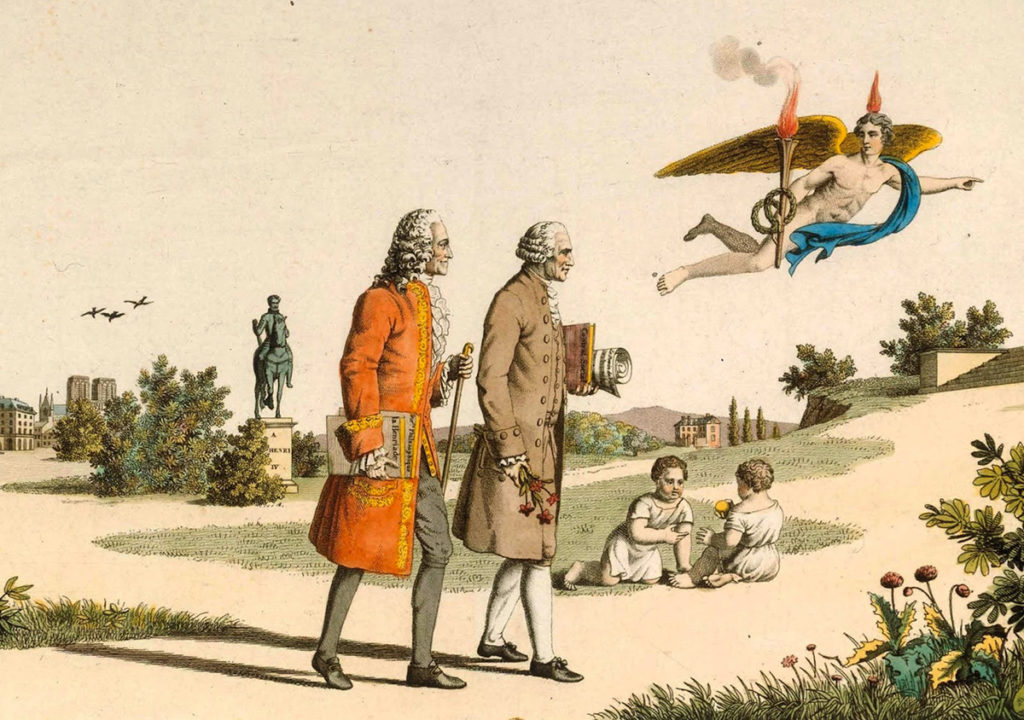
Humanly Possible: Seven Hundred Years of Humanist Freethinking, Inquiry, and Hope by Sarah Bakewell; Penguin Press, 464 pp., $30
If brown rats spoke a human language, they would coin the term rodentism to affirm their conviction that the world is their trash can. Homo sapiens, however, is convinced, with Protagoras, that “Man is the measure of all things,” and so we invented humanism. The doctrine rests, according to Sarah Bakewell, on three principles: “Freethinking, Inquiry, and Hope.” And it is her fervent hope that we each live the one life we have with joy, curiosity, and compassion. She is an evangelist for a movement that substitutes reason for religious dogma.
In books such as How to Live and At the Existentialist Café, Bakewell has made a career of writing engagingly about philosophy for nonphilosophers. To the back of her latest book, Humanly Possible, she appends the “Declaration of Modern Humanism,” adopted last year in Glasgow by the General Assembly of Humanists International. “We affirm the worth and dignity of the individual and the right of every human to the greatest possible freedom and fullest possible development compatible with the rights of others,” it proclaims. But Bakewell’s new volume is a more effective manifesto. It grounds its precepts about how to live in the practices of humanists from the 14th century to the present. Humanly Possible is not quite a history as much as a chronologically ordered pantheon.
Bakewell makes use of pungent anecdotes to introduce us to the thinkers she most admires, including Francesco Petrarch, Giovanni Boccaccio, Erasmus, Michel de Montaigne, David Hume, Voltaire, Denis Diderot, Wilhelm von Humboldt, John Stuart Mill, Robert Ingersoll, Thomas Huxley, and Bertrand Russell. These are the usual suspects for anyone looking to understand modern intellectual history, but she also celebrates less familiar figures like Lorenzo Valla, who undermined Vatican power by demonstrating that the Donation of Constantine—by which Emperor Constantine allegedly consigned Western Europe to papal rule—was a forgery. Ludwik Zamenhof, who devised Esperanto as an efficient, rational means of communication and an instrument for world peace, is another of her humanist heroes.
Unaccountably missing from the discussion is Elizabeth Cady Stanton, who alienated herself from the mainstream of the women’s movement when she debunked Christianity with The Woman’s Bible in 1895, and barely mentioned is Kurt Vonnegut, who was named 1992 Humanist of the Year by the American Humanist Association and who declared, “I am a humanist, which means, in part, that I have tried to behave decently without any expectation of rewards or punishments after I’m dead.” Absent, as well, are Richard Dawkins, the evolutionary biologist who is the most prominent contemporary polemicist against religion, and John Lennon, who, rejecting heaven and hell, sang, “Imagine all the people / Living for today.”
Recovering classical texts that, like Cicero’s speeches, embodied ideals of secular virtue was a notable feature of Renaissance Humanism. Terence’s line Homo sum, humani nihil a me alienum puto (“I am a man, and nothing that is human is alien to me”) explains the hunger of such Renaissance omnivores as Leon Battista Alberti, Leonardo da Vinci, and Giovanni Pico della Mirandola. Enlightenment figures mounted a forthright attack against Church authority, and 19th-century thinkers made liberal education essential to the humanistic program. Recent humanists have struggled to sustain hope despite genocide, environmental devastation, and rampant irrationality. Many have learned to curb the arrogance of presuming that human beings—and not brown rats, dolphins, chimpanzees, or any other species—are the measure of all things.
Even when obscurantism, indoctrination, and censorship do not limit the full exercise of our humanity, thoughts are never entirely free. Unless guided by knowledge, logic, and empathy, “freethinking” becomes impulsive and potentially destructive. Bakewell knows that humanism is a response to the strong current of antihumanism manifest in the Inquisition, war, slavery, and totalitarianism. In our time, she recognizes as enemies of promise “a whole breed of authoritarian, fundamentalist, illiberal, repressive, war-mongering, misogynistic, racist, homophobic, nationalist, and populist manipulators, some of whom claim devotion to traditional religious pieties, whether or not this is sincere.” Humanism demands active resistance to the ambient bigotry and blarney, and success is rarely immediate. The most robust expressions of humanistic principles, by Hume, Diderot, E. M. Forster, Vasily Grossman, and others, were published only posthumously.
Bakewell begins and ends Humanly Possible by quoting the dictum of Ingersoll, the 19th-century American orator nicknamed “the Great Agnostic”: “Happiness is the only good.” Lest that be taken as a prescription for narcissistic hedonism, Ingersoll adds, “The way to be happy is to make others so.” Nevertheless, exactly what constitutes “happiness” remains unclear, nor do humanists prescribe precisely how, without relying on a supernatural being or any expectation of an afterlife, it is best to seize the day.
We live in the epoch of the Anthropocene, when humans dominate Earth—to the boon and the bane of both humans and the planet. A buoyant meliorist, a devoted member of Ralph Waldo Emerson’s Party of Hope, Bakewell is convinced that men and women of goodwill can increase the sum total of happiness. But a vision of the abyss has always haunted humanism. Though Ophelia describes Hamlet as the consummate Renaissance man—“The courtier’s, soldier’s, scholar’s eye, tongue, sword; / The expectancy and rose of the fair state, / The glass of fashion and the mould of form”—he himself finds “all the uses of this world” to be “weary, stale, flat, and unprofitable.” An ambitious painter, sculptor, architect, engineer, inventor, anatomist, botanist, and astronomer for whom nothing human was alien, Leonardo left many of his creations unfinished and recognized that humanity was nothing: “Amid the vastness of the things among which we live, the existence of nothingness holds the first place.” The urgent, continuing challenge is to keep 700 years of humanist freethinking, inquiry, and hope from amounting to nothing.

